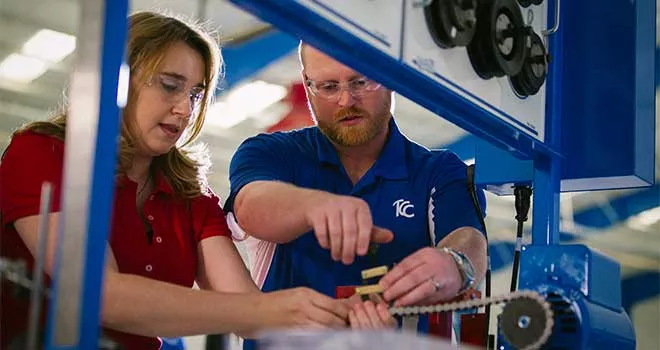Manufacturing Engineering Technology - Engineering Technology, A.A.S.
TCC's Manufacturing Engineering Technology program prepares you for a career in manufacturing with hands-on training and national certification opportunities.
About the Manufacturing Engineering Technology Degree
- Gain solid knowledge and skills in applied engineering.
- Become a certified manufacturing engineer upon program completion.
- Join Tulsa's thriving manufacturing industry as a machinist, assembler, or technician.
- Manufacturing Engineers play a crucial role in designing, directing, and coordinating the production process at all levels.
- They define requirements for facilities, equipment, machinery, materials, and processes.
- Explore a wide range of subjects, including Aeronautical Engineering.
- TCC offers various Engineering Technology options to prepare for employment.
- Programs include General Education courses, common core classes, and specialized technology area courses.
Manufacturing Engineering Technology Degree Details
Discover the world of manufacturing engineering, from creating build plans to enhancing production processes.
After successfully completing this program, you will have the ability to:
- Manage manufacturing safety.
- Use precision measurement equipment.
- Create control charts.
- Communicate manufacturing concepts.
- Employ continuous improvement methodology in manufacturing.
- Interpret engineering drawings.
- Function in diverse teams.
View the Degree Requirements to find out which courses and credits you'll need to earn your degree.
Explore the Program Map to see how you can complete your degree.
TCC's Manufacturing Engineering classes follow the objectives of the Certified Production Technician, which adheres to specifications set by the Manufacturing Standard Skills Certification, a national industry-standard certifying body.
Graduates of the TCC program are eligible to take the CPT national certification. In addition, graduates earn 12 college credit hours within the Engineering Technology degree program and receive a TCC Workforce Certificate of Achievement. Each class is worth three college credits, is stackable, and could lead to an Associate in Engineering Technology or a more advanced degree.
Training is based on the Certified Production Technician.
Technical instruction develops skills in four key areas:
- Safety covers topics such as responsibilities, inspection, emergency preparedness, workplace behavior, ear and eye wear, equipment handling, etc.
- Quality includes blueprint reading (assemblers, fasteners, geometric dimensioning, tolerancing, etc.), tape and precision measurement, dimensional gauging, quality systems and more.
- Manufacturing Processes and Production focuses on product creation, mechanical principles (concepts, force measurements, torque and moments, levers and mechanical advantage) mechanical linkages, machining processes, machine operation, production workflow, etc.
- Maintenance Awareness touches on basic electric circuits, pneumatic power systems, hydraulic power systems, lubrication concepts, belt/chain drives, machine control concepts, etc.
The Advanced Manufacturing and Related Pathways grant at TCC is a $2.5 million award from the U.S. Department of Labor. The grant allows TCC to build linkages between secondary, community colleges, four-year institutions, and community partners to create new career pathways in the manufacturing and related industries.
Program Contact
School of Mathematics & Engineering
mathengineering@tulsacc.edu
918-595-7742

Careers in Manufacturing Engineering Technology
Don't miss out on the opportunity to connect with our Career Services professionals. Schedule a session now to explore the comprehensive range of complimentary resources available for career planning and job preparation.
